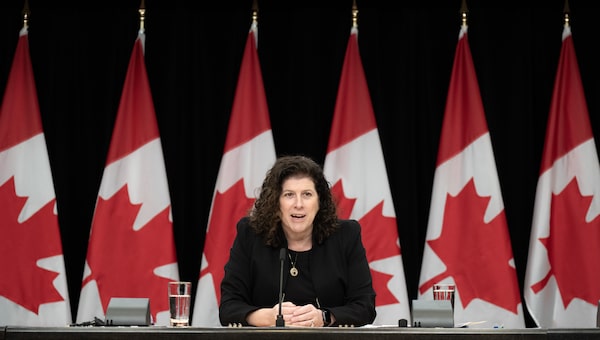
Auditor-General Karen Hogan speaks about the ArriveCan app at a news conference in Ottawa on Feb. 12.Adrian Wyld/The Canadian Press
We haven’t got to the bottom of the ArriveCan debacle, but it sure has drawn out a host of other problems inside government.
The mystery of how the bill got so big remains unsolved. The question of who decided the best way to build the app was to pay a two-person company named GCStrategies millions to hire subcontractors has not been satisfactorily answered.
Still, the questions beget other unseemly details.
Just two weeks ago we learned that David Yeo, the chief executive officer of an IT company named Dalian that has won millions in government IT contracts, was working for the government as a public servant.
Mr. Yeo has since said he started working for the government after all his contracting, but people were already asking about public servants two-timing as government contractors. That led to the embarrassing revelation, first reported by the National Post, that the office of Auditor-General Karen Hogan had fired two employees who also had government contracts.
That’s the office of the Auditor-General of Canada, the folks who are tasked with delving through government spending records to uncover abuses. And if there is double-dipping there, it has to make you wonder just how many people in run-of-the-mill government departments are also doubling up as contractors.
Shaking the ArriveCan tree has made a lot of other things fall out. And the world of government contracting looks a lot like a place where the system is made for gaming.
Dalian’s role as a joint-venture partner with a firm called Coradix has raised questions about the government’s procurement set aside for Indigenous firms. Mr. Yeo told a Commons committee that Dalian qualified as an Indigenous firm because his great-grandfather was a chief of Alderville First Nation, but it is not clear how much of the work, if any, was done by Indigenous workers.
The ArriveCan debacle sparked another small company, Botler, to go public with complaints that they had arranged to do some work with the Canada Border Services Agency, but were surprised when they were told their work would go through a contract with Dalian and Coradix – firms they had never heard of.
That complaint, as it turns out, wasn’t about some unique situation. That’s how government IT contracting often works – through a middleman.
Which brings us back to ArriveCan, and to GCStrategies. The company’s CEO, Kristian Firth, appeared before a Commons committee for the third time on Wednesday, and testified that his two-person firm earned $2.5-million in commissions over two years for about 30 to 40 hours work a month.
GCStrategies, let’s recall, doesn’t do the actual IT work. They get contracts from the government and then subcontract the work, and add a 15- to 30-per-cent commission. They invoice the work, but don’t manage the project or the budget. And on ArriveCan that apparently added up to about $2,600 an hour.
Mr. Firth had a pretty good answer when asked to justify the government paying big bucks for a middleman.
“I don’t make that decision. The government obviously sees value in what we do.”
The people he hires, Mr. Firth testified, can’t do business directly with the government unless they become qualified vendors. Officials won’t open a whole new contract for work they need quickly because that can take months. In effect, the officials need a contractor to hire IT professionals because they can’t, at least not quickly.
That means getting government contracts is the real money-making business. And there isn’t much doubt that’s what GCStrategies does. The GC in the company’s name, Mr. Firth testified, stands for Government of Canada. And it seems pretty clear the strategy is to fill the gap in the government’s defective procurement system – and get rich doing it.
Whether there is more than that remains an open question. Ms. Hogan reported in February that GCStrategies had been involved in setting restrictive criteria for a 2022 contract with CBSA that they later won. But Mr. Firth refused to answer questions about it, saying the Auditor-General had provided information to the RCMP and it might be under investigation.
There are still, despite hearings and audits and reports and continuing investigations, ArriveCan mysteries. But the questions about this one pandemic app have spilled a bigger can of worms.